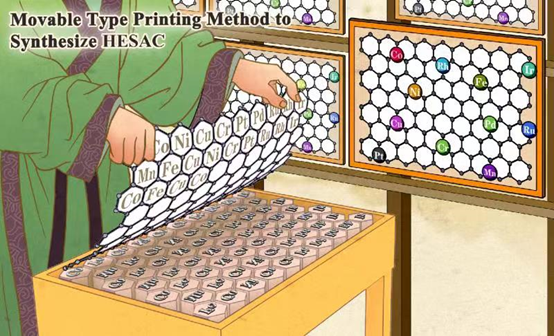近日,海南大学南海海洋资源利用国家重点实验室海洋动力资源方向,田新龙教授“海洋清洁能源”创新团队在Nature Communications发表了题为《活字印刷术合成高熵单原子催化剂》的研究论文。海南大学化学工程与技术学院2020级博士生饶鹏为论文第一作者,南海海洋资源利用国家重点实验室田新龙教授为通讯作者。
Recently, MRU Professor Tian Xinlong and his “Clean Energy in the Ocean” innovation team whose research interest is marine power resources published a paper entitled “Movable type printing method to synthesize high-entropy single-atom catalysts” in Nature Communications. Rao Peng, a 2020 Ph.D. student in the School of Chemical Engineering and Technology of Hainan University, is the first author, and Professor Tian Xinlong is the corresponding author.

当前我国正加速推动能源结构变革,氢能作为实现“双碳”目标的重要途径,其发展已成为全球性的研究热点。开发高效的氢能转换技术是国家能源战略和经济可持续发展的重大需求。质子交换膜燃料电池因其能量转化效率高、功率密度大、零污染、无碳排放等优点,被誉为21世纪最具应用前景的清洁能源技术之一,也因此被视为新能源汽车和多种供能装置理想动力源。开发廉价且具有高性能的非贵金属氧还原催化剂和膜电极,对推动燃料电池的大规模商业化和可持续发展、以及我国和海南省氢能产业的可持续发展都具有十分重要的意义。
The development of hydrogen energy, an important way to achieve the carbon peaking and carbon neutrality goals, has become a global research hotspot. The development of efficient hydrogen energy conversion technology is a major demand for national energy strategy and sustainable economic development. Proton exchange membrane fuel cell is regarded as one of the most promising clean energy technologies in the 21st century due to their high efficiency, high power density, zero pollution and no carbon emission, and are therefore considered as the ideal power source for new energy vehicles and various energy supply devices. The development of cheap and high-performance noble metals oxygen reduction catalysts and membrane electrodes is of great importance to promote the large-scale commercialization and sustainable development of fuel cells, as well as the sustainable development of hydrogen energy industry in China and Hainan Province.
单原子催化剂由于其独特的电子结构,均一的活性中心和接近100%的原子利用率,在众多催化反应中均展示出了优异的催化活性,展现出巨大的应用前景。另一方面,多元活性中心单原子往往能提供更多种类的活性中心,且相邻原子间的协同作用也有益于提高其电催化活性,被认为是单原子催化剂的下一个突破口。然而,目前的单原子催化剂的研究一般仅限于一元至二元单原子催化剂,对于多元活性中心单原子催化剂的研究报道很少,主要是难以实现将不同种类的金属原子稳定的锚定在单一载体上,极大的限制了单原子催化剂的研究和应用领域。因此,迫切需要开发一种通用且高效的方法来实现具有多元活性中心的单原子的可控合成。
Single-atom catalysts (SACs) have attracted enormous attention due to their intrinsic advantages, such as unique geometric and electronic properties and maximum atom utilization. It also possesses impressive activity, demonstrating great potential for practical application. In addition, multiple-active-center single atoms tend to provide a wider variety of active centers and the synergistic effect between adjacent atoms is also beneficial to improve their electrocatalytic activity, which is considered as the next breakthrough for SACs. However, there have been only few works on the preparations and applications of dual or binary single-atom catalysts (BSACs), while multimetallic SACs, which can be expected to exhibit more attractive performance and functionalities, have rarely been reported because it is difficult to stabilize multiple isolated metal atoms into a single support, which greatly limits the research and application fields of SACs. Hence, developing a general and highly efficient method that can control SACs with multimetallic centers is urgently desirable.

本文灵感来源于“活字印刷术”,报道了一种简便、高效的“点对点”印刷策略实现了单原子催化剂从五元到十一元的可控制备。作为典型案例,所制备的五元高熵单原子催化剂展现出了优异的催化活性,耐久性和器件性能。该论文是“海洋清洁能源”创新团队继5月份在Cell子刊Cell Rep. Phys. Sci. 2022, 3:100880发文以来,在催化剂的精确设计与调控(J. Mater. Chem. A 2022, 10, 6531; Small, 2022, 202203506; Appl. Catal. B: Environ. 2022, 317, 121796; Chem. Eng. J. 2022, 448, 137709),催化机理和衰减机制解析(Energy Environ. Mater. 2022, 12371; eScience 2022, 10.1016/j.esci.2022.05.004; Mater. Today Nano 2022, 18, 100216; Carbon Energy 2022, 10.1002/cey2.192),规模化合成和器件应用(Appl. Energy 2022, 317, 119213; ACS Appl. Mater. Interfaces 2022, 14, 11, 13369; Appl. Catal. B: Environ. 2022, 308:121223; J. Energy Chem. 2022, 70, 230),团队在氢能利用领域取得又一个突破。
Inspired by movable type printing method, this paper reported a simple and efficient “point-to-point” printing strategy for the controlled preparation to produce HESACs (high-entropy single-atom catalysts (HESACs) from five metals to eleven metals. Notably, as an example, the prepared quinary HESACs (FeCoNiCuMn) catalyst displays good activity, durability and device performance. This is the team’s new breakthrough in the field of hydrogen energy utilization in that this paper is a follow-up to the paper published by the team in the Cell Rep. Phys. Sci. 2022, 3:100880 in May, and to the achievements of the precise design and regulation of catalysts (J. Mater. Chem. A 2022, 10, 6531; Small, 2022, 202203506; Appl. Catal. B: Environ. 2022, 317, 121796; Chem. Eng. J. 2022, 448, 137709), catalytic mechanisms and decay mechanisms (Energy Environ. Mater. 2022, 12371; eScience 2022, 10.1016/j.esci.2022.05.004; Mater. Today Nano 2022, 18, 100216; Carbon Energy 2022, 10.1002/cey2.192), scale-up synthesis and device applications (Appl. Energy 2022, 317, 119213; ACS Appl. Mater. Interfaces 2022, 14, 11, 13369; Appl. Catal. B: Environ. 2022, 308:121223; J. Energy Chem. 2022, 70, 230).
该研究得到了国家自然科学基金(22109034, 22109035, 52164028, 62105083)、海南省重点研发计划(ZDYF2021GXJS207, ZDYF2020207, ZDYF2020037)、南海海洋资源利用国家重点实验室开放基金(MRUKF2021029)、 海南大学科研启动基金(KYQD(ZR)-20008, 20082, 20083, 20084, 21065,21124,21125)和海南省院士创新平台专项研究基金的资助。
The work was supported by the National Natural Science Foundation of China (22109034, 22109035, 52164028, 62105083), the Hainan Province Science and Technology Special Fund (ZDYF2021GXJS207, ZDYF2020037, ZDYF2020207), the Foundation of State Key Laboratory of Marine Resource Utilization in South China Sea (Hainan University, Grant No. MRUKF2021029), and the Start-up Research Foundation of Hainan University (KYQD(ZR)−20008, 20082, 20083, 20084, 21065, 21124, 21125), and the specific research fund of The Innovation Platform for Academicians of Hainan Province.
通讯作者简介:
Introduction to the corresponding author:
Image

田新龙,海南大学南海海洋资源利用国家重点实验室教授、博士生导师;中国化工学会储能工程专业委员会委员、海南省电化学储能与能量转换重点实验室副主任;2016年于华南理工大学获得工学博士学位,随后于华中科技大学从事博士后研究工作;2019年3月加入海南大学南海海洋资源利用国家重点实验室,担任“海洋清洁能源”创新团队负责人。长期从事纳米催化材料功能化设计及其在环境与能源领域的应用基础研究,包括电催化、光/电解海水制氢、氢燃料电池和可燃冰转化。在 Science, Nat. Commun., Cell. Rep. Phys. Sci, J. Am. Chem. Soc.和Joule等学术期刊上发表SCI论文120余篇,先后主持国家级和省部级基金11项,授权国家发明专利1项,美国发明专利1项;担任Sci. Rep. 编委,Carbon Energy, Adv. Powder Mater.、Rare Metals和Chin. J. Struc. Chem.青年编委,储能科学与技术杂志“氢能与燃料电池”专刊特邀主编;荣获“侯德榜化工科学技术青年奖”、“海南青年五四奖章”和海南省“最美科技工作者”等荣誉称号。
Tian Xinlong is Professor and Doctoral Supervisor of MRU, Member of the Professional Committee of Energy Storage Engineering of Chinese Chemical Society, Deputy Director of the Hainan Provincial Key Laboratory of Electrochemical Energy Storage and Energy Conversion, one of the “Leading Talents” of Hainan Province; he received his doctorate in engineering from South China University of Technology in 2016, which was followed by his postdoctoral research at Huazhong University of Science and Technology. In March 2019, he joined MRU as the leader of the “Clean Energy in the Ocean” innovation team. He has long been engaged in the design of functionalized design of nanocatalytic materials and their basic applied research in the field of environment and energy, including electrocatalysis, hydrogen production by photo/electrolysis of seawater, hydrogen fuel cell and combustible ice conversion. He has published more than 120 SCI papers in Science, Nat. Commun., Cell. Rep. Phys. Sci, J. Am. Chem. Soc. and Joule, etc. He has hosted 11 national- and provincial-level projects, owned one national invention patent and one US invention patent, and served as editorial board member of Sci. Rep. and young editorial board member of Carbon Energy, Adv. Powder Mater., Rare Metals and Chin. J. Struc. Chem. He was awarded the “Hou Debang Chemical Science and Technology Youth Award”, “Hainan Youth May Fourth Medal” and “The Most Beautiful Science and Technology Worker” in Hainan Province.
原文链接:https://doi.org/10.1038/s41467-022-32850-8
初审:田新龙
撰稿人:饶鹏
翻译:张宇
排版:戴欣霖
审核:邓群
First reviewer: Tian Xinlong
Chinese writer: Rao Peng
English writer: Zhang Yu
Compositor: Dai Xinlin
Final reviewer: Deng Qun